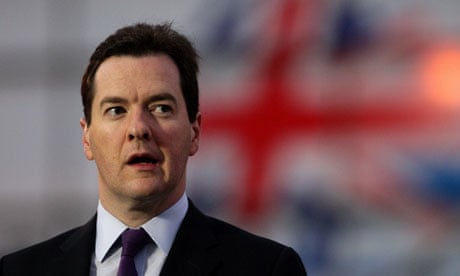A campaign by George Osborne to link Ed Balls to the Libor rate setting scandal ran into trouble on Sunday when it emerged that the cabinet secretary raised concerns about the rate with the Bank of England at the height of the financial crisis in 2008.
As Vince Cable, the business secretary, accused banks of "throttling" the economic recovery, it emerged that Sir Jeremy Heywood questioned the Bank's deputy governor, Paul Tucker, over the rate as the last government fought to shore up the economy by bringing down the costs of borrowing.
The chancellor's campaign against Balls, which involved an unsuccessful trawl for damaging information about him in the City of London last week, will be placed in the spotlight on Monday when Tucker gives evidence to the Treasury select committee.
Tucker last week found himself at the centre of the scandal over the fixing of the London Interbank Offered Rate (Libor) when Barclays released a memo by Bob Diamond, its ousted chief executive, of a conversation with the deputy governor in October 2008. Diamond quoted Tucker as saying that senior Whitehall figures were concerned about the high rate of Libor, a view shared at the time by Osborne's deputy, Philip Hammond. In his evidence to the Treasury select committee, Diamond said that Tucker had meant ministers.
But on Sunday Whitehall sources confirmed a report in the Mail on Sunday that Heywood, who was the No 10 permanent secretary in 2008, had raised concerns about the Libor rate with Tucker. A Cabinet Office spokesman said of the claim: "We have no comment to make." However, a Whitehall source said: "Yes there was contact at that time between Jeremy Heywood [and the Bank]. You would expect that. We were in the midst of the biggest financial crisis in 60 years. There was no conversation about anything improper or irregular … There was no discussion around the manipulation of interest rates."
The disclosure of Heywood's role will come as a blow to Osborne who pounced on the Diamond memo to try to link Balls irrevocably to the banking crisis. Hours after the appearance of the memo on Tuesday, the chancellor told the Spectator that allies of Gordon Brown were "clearly involved" in attempts to manipulate the Libor rate. He added that Balls had "questions to answer".
Aides to Osborne said that he never directly linked Balls to the Libor rate scandal and the chancellor had merely said that his counterpart had questions to answer. But his defence was undermined when the Conservative party directly linked Balls to the Libor manipulation. In a note on Wednesday, distributed after Diamond's evidence, the party said that Balls was one of the "'senior figures' trying to fiddle Libor".
The row over the Libor rate in 2008 came as Cable accused banks of "throttling" the economic recovery because of an anti-business culture which focuses on short-term profits. He told the Andrew Marr Show on BBC1 on Sunday,: "The real problem at the moment is that the banks – because of their existing culture, which is frankly anti-business, obsession with short-term trading profits, not focusing on the long term – are throttling the recovery of British industry."
Ed Miliband will on Monday announce measures to introduce "root and branch change" to the banking industry, including:
Tackling the bonus culture. The Labour leader says this contrasts with the approach of Osborne who will this week raise objections to new EU rules on bonuses.
Breaking the dominance of the five main high street which would be forced to sell up to 400 branches. This would take the total sale of branches to around 1,000 because Lloyds is selling 650 branches to the Co-operative Bank. This would allow two new "challenger banks", run by the private sector, to offer more choice and lower charges.
Creating a British investment bank to improve lending to small businesses.
Setting up a financial crime unit at the Serious Fraud Office "so that our country is no longer a soft touch for white collar crime".
Implementing in full the Vickers report which called for a ring-fencing of retail banking from investment banking.
Miliband will say: "Today I am going to tell you what a better banking system would look like. I will describe the first steps towards moving from the casino banking we have to the stewardship banking we need.
"It will mean root and branch change for our banks if we are to deliver real change for Britain, if we are to rebuild our economy so it works for working people, and if we are to restore trust in a sector of our economy worth billions of pounds and hundreds of thousands of jobs to our country."








Comments (…)
Sign in or create your Guardian account to join the discussion